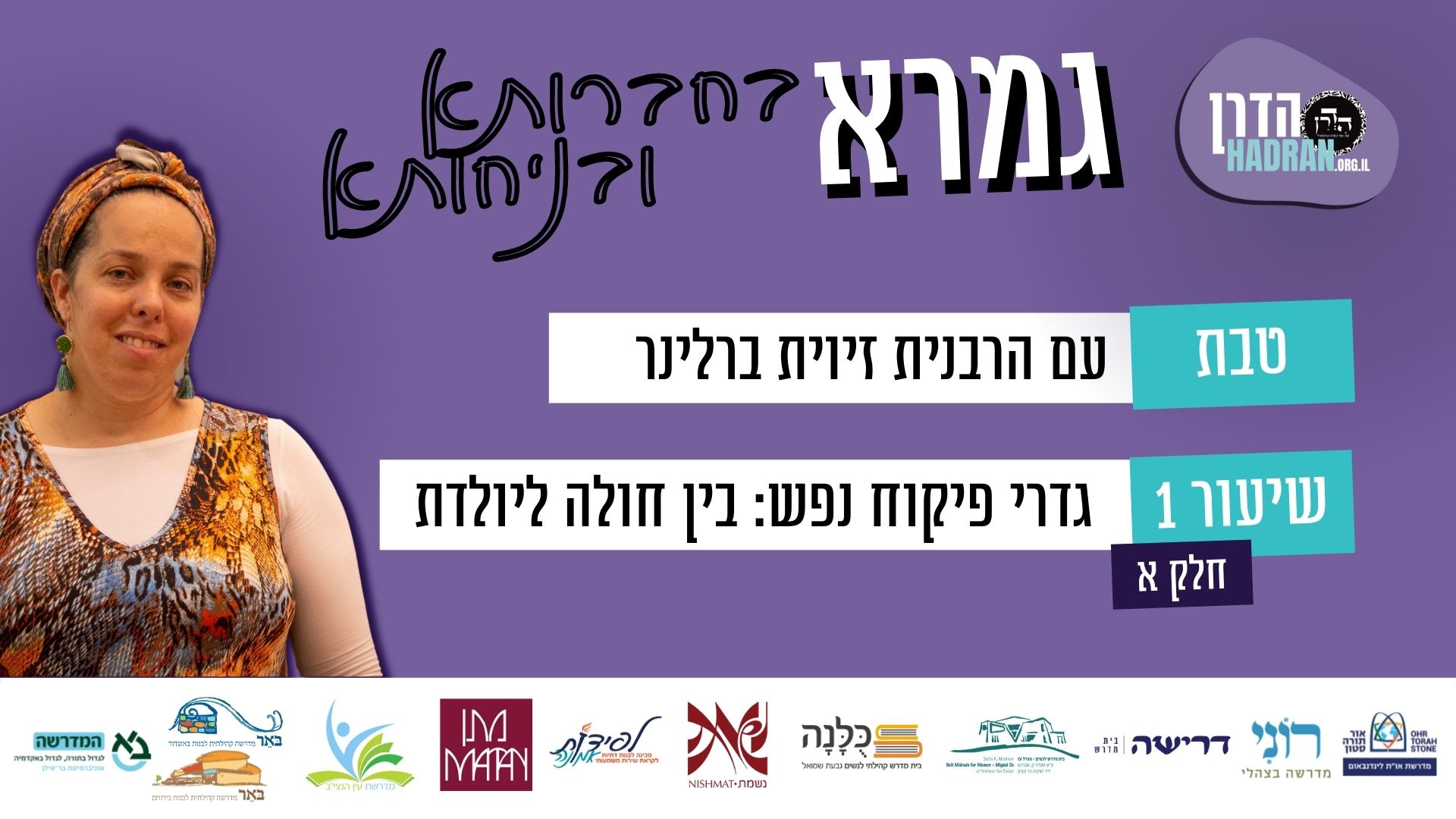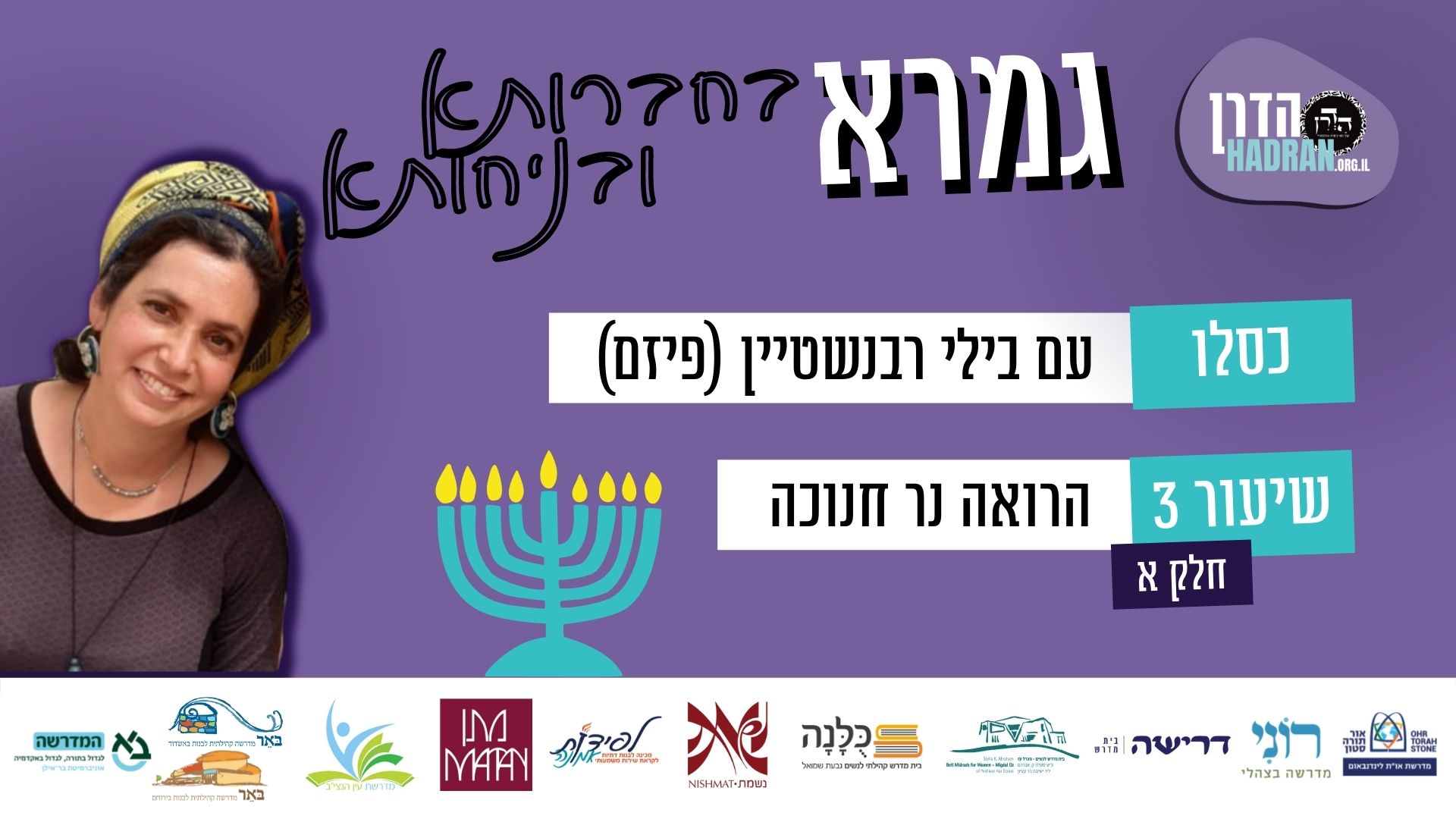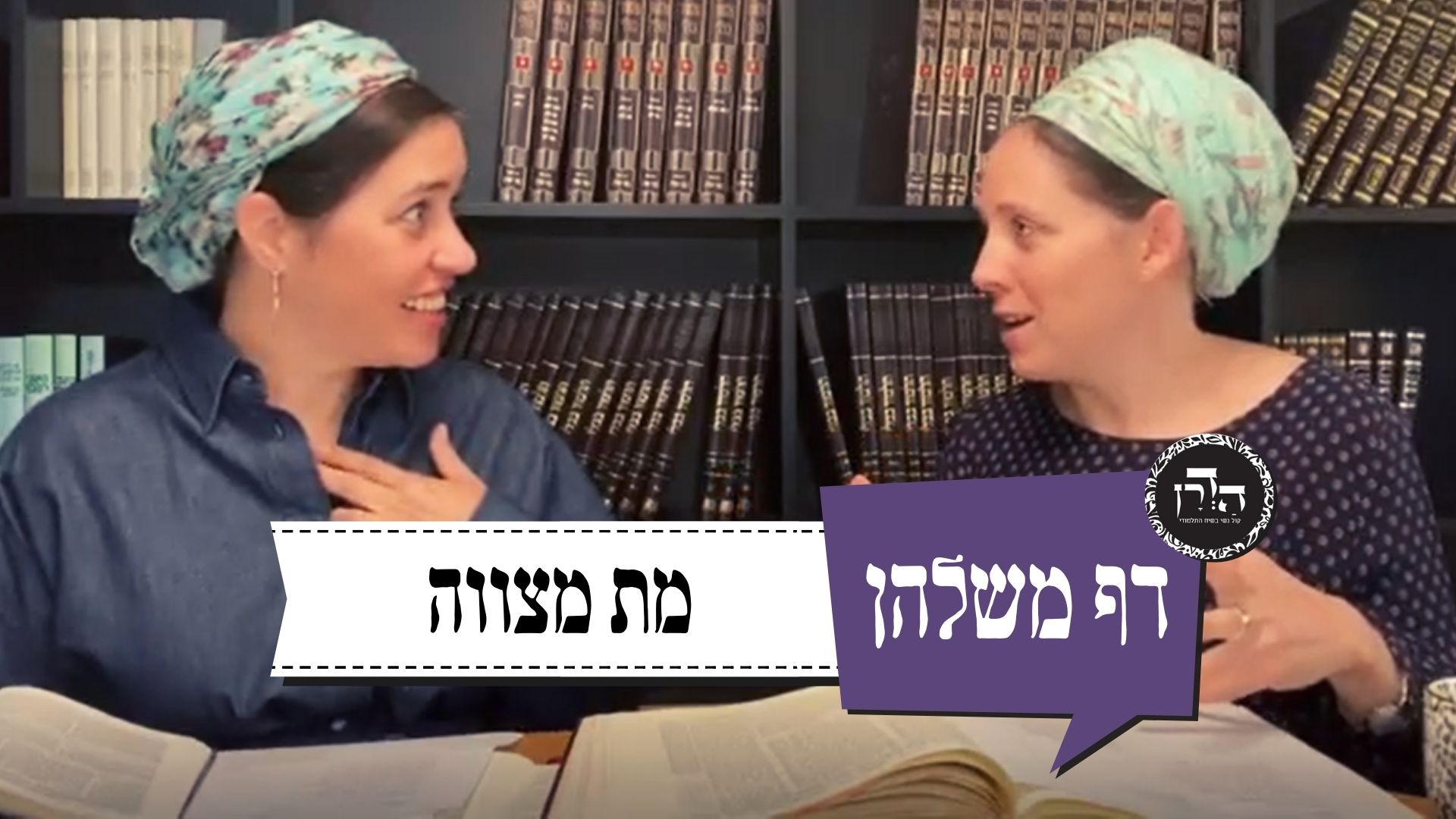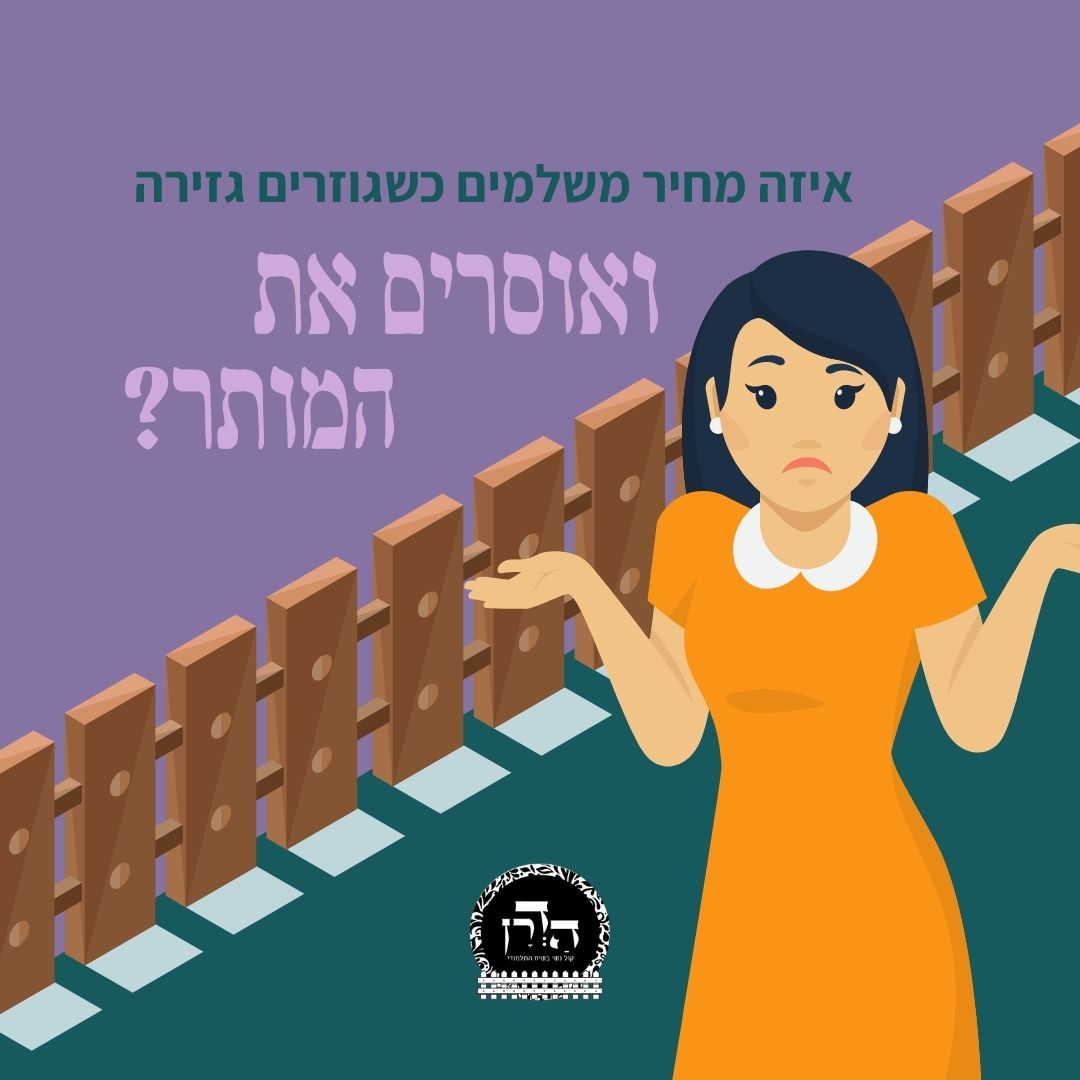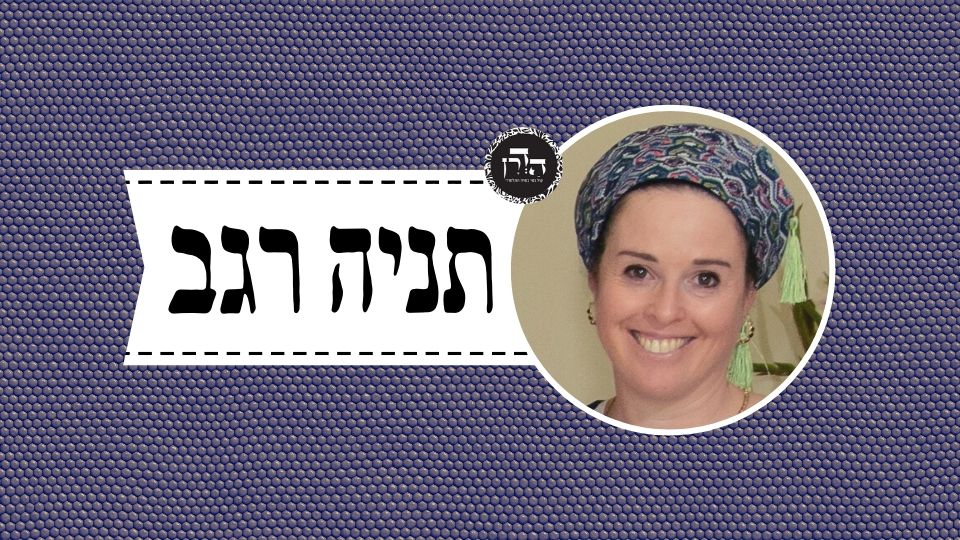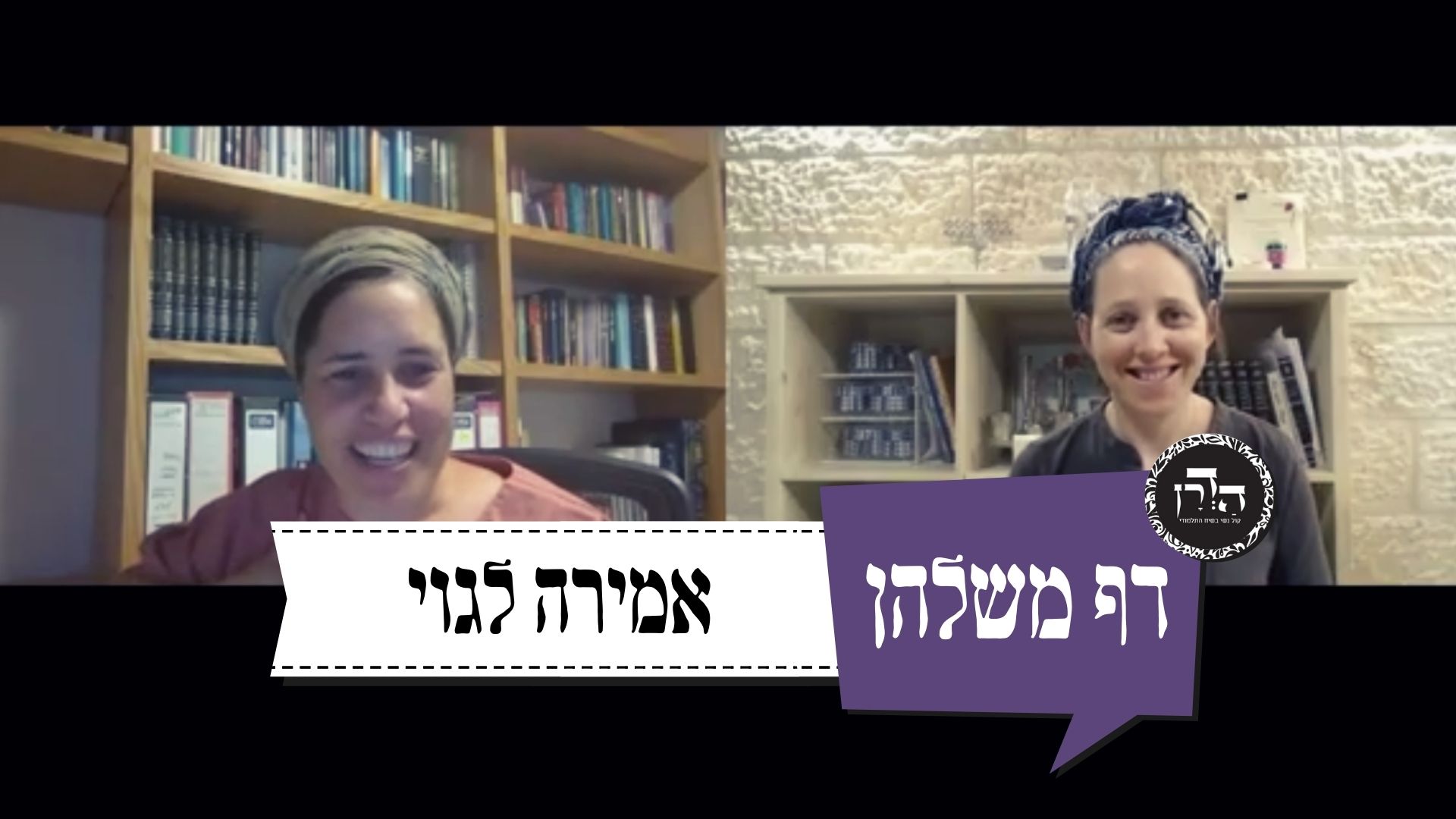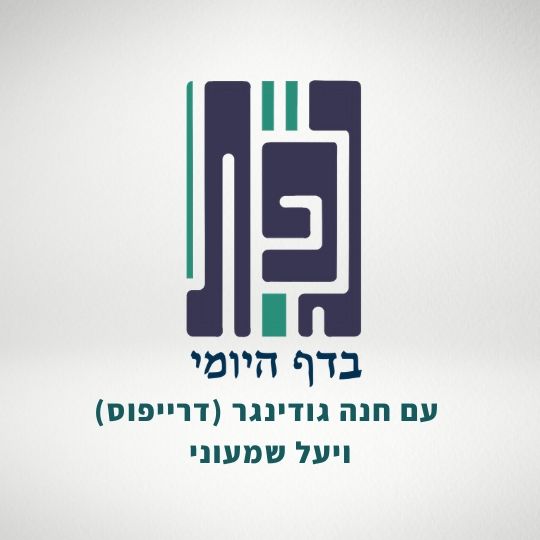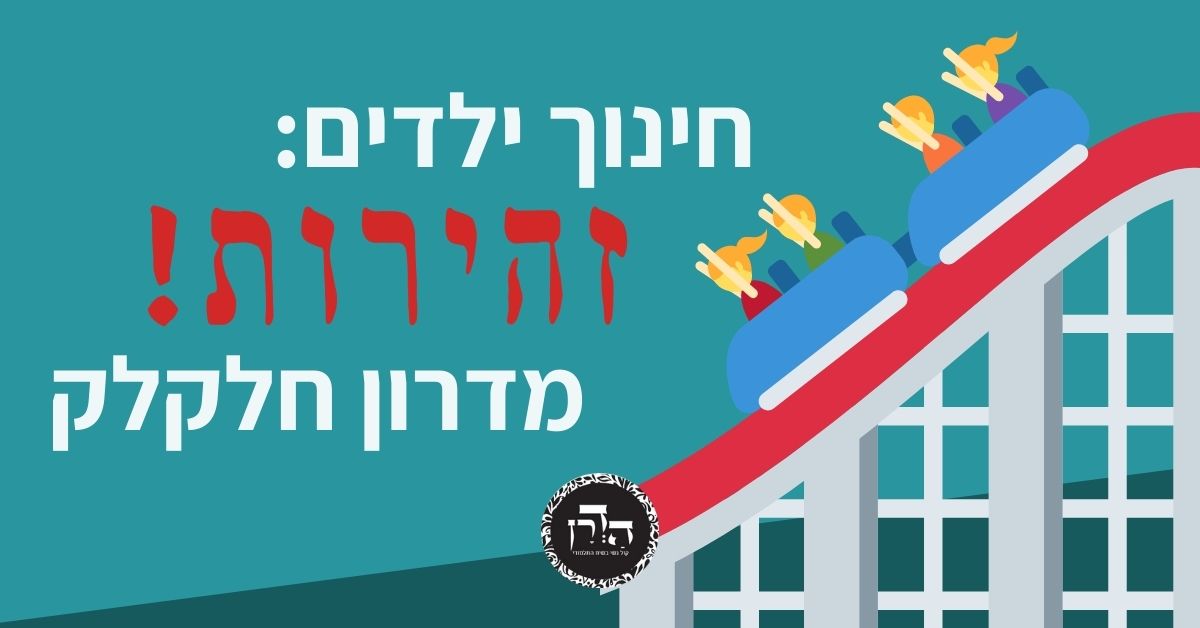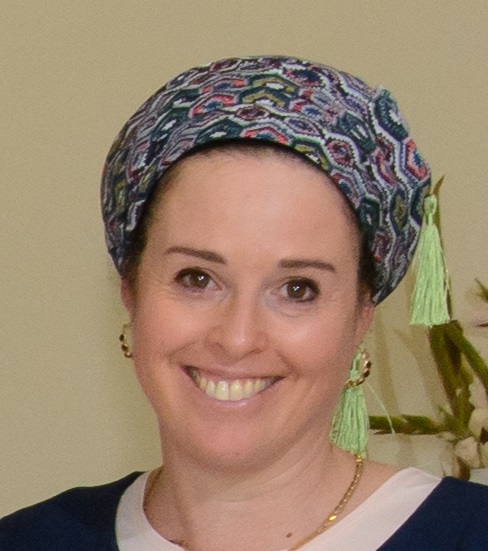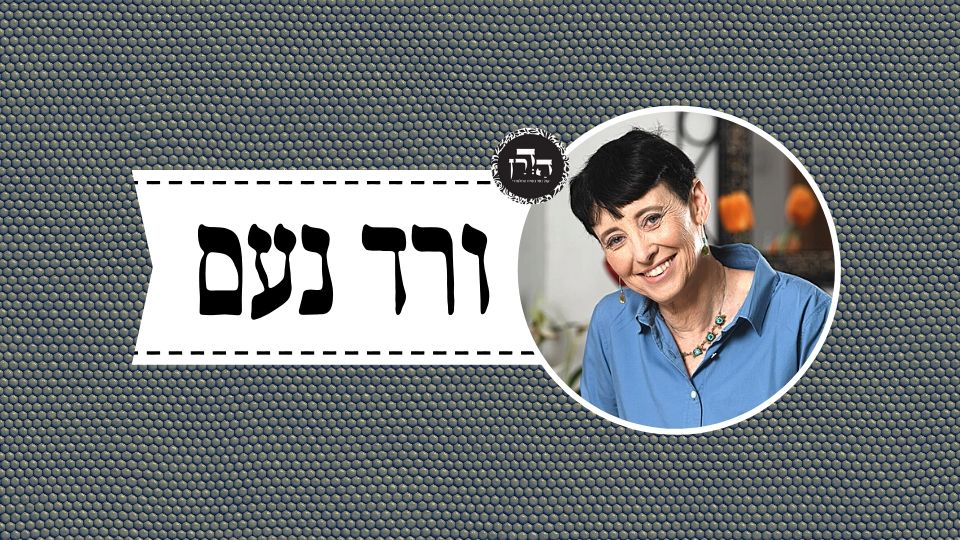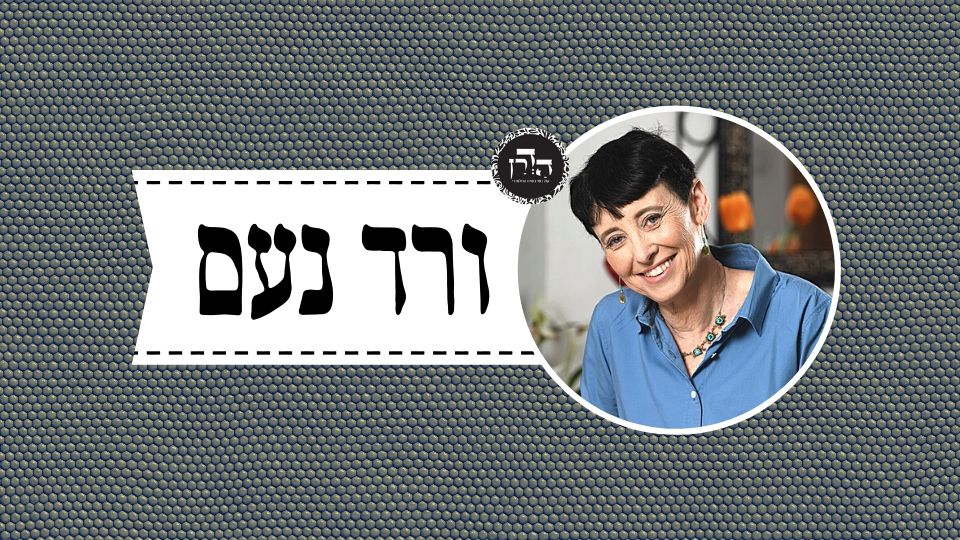האם באמת כל המקלקל פטור? מה לגבי חובל ומבעיר? יש מחלוקת בין ר’ שמעון ור’ יהודה בנושא. מתי חייבים במלאכת צידה לגבי עופות, בהמות ודגים? במה זה תלוי?
הלימוד השבוע מוקדש לזכות ולשלום הַיְימׇנוֹט אֱמוּנָה בַּת באנצ’י (קָסָאוּ) בת 11 שנעלמה במקום מגוריה בצפת, לפני שנתיים, ביום ט”ז אדר תשפ”ד (25.2.24), ולא נודעו עקבותיה.
הלימוד השבוע מוקדש למען ביטחון המדינה, החיילים והאזרחים, ולמען חירותו של העם האיראני. שנזכה בקרוב שיתקיים בנו הפסוק: "לַיְּהוּדִים הָיְתָה אוֹרָה וְשִׂמְחָה וְשָׂשֹׂן וִיקָר”.
הלימוד השבוע מוקדש לזכות וְלִשְׁלוֹם הָיימָנוֹט אֱמוּנָה בַּת באנצ’י (קָסָאוּ), בת 11 שנעלמה במקום מגוריה בצפת, לפני שנתיים, ביום ט”ז אדר תשפ״ד (25.2.24), ולא נודעו עקבותיה. אנו מתפללים שֶׁתִּמָּצֵא וְתוּשַׁב לביתה במהרה!
רוצה להקדיש שיעור?

כלים
הלימוד השבוע מוקדש לזכות ולשלום הַיְימׇנוֹט אֱמוּנָה בַּת באנצ’י (קָסָאוּ) בת 11 שנעלמה במקום מגוריה בצפת, לפני שנתיים, ביום ט”ז אדר תשפ”ד (25.2.24), ולא נודעו עקבותיה.
הלימוד השבוע מוקדש למען ביטחון המדינה, החיילים והאזרחים, ולמען חירותו של העם האיראני. שנזכה בקרוב שיתקיים בנו הפסוק: "לַיְּהוּדִים הָיְתָה אוֹרָה וְשִׂמְחָה וְשָׂשֹׂן וִיקָר”.
הלימוד השבוע מוקדש לזכות וְלִשְׁלוֹם הָיימָנוֹט אֱמוּנָה בַּת באנצ’י (קָסָאוּ), בת 11 שנעלמה במקום מגוריה בצפת, לפני שנתיים, ביום ט”ז אדר תשפ״ד (25.2.24), ולא נודעו עקבותיה. אנו מתפללים שֶׁתִּמָּצֵא וְתוּשַׁב לביתה במהרה!
כלים
העמקה
רוצה להבין מה באמת קורה מתחת לפני השטח של הסוגיה?
שיעורים, פודקאסטים והרחבות של מיטב המורות שלנו יפתחו לך עוד זוויות וכיווני חשיבה.
חדשה בלימוד הגמרא?
זה הדף הראשון שלך? איזו התרגשות עצומה! יש לנו בדיוק את התכנים והכלים שיעזרו לך לעשות את הצעדים הראשונים ללמידה בקצב וברמה שלך, כך תוכלי להרגיש בנוח גם בתוך הסוגיות המורכבות ומאתגרות.
פסיפס הלומדות שלנו
גלי את קהילת הלומדות שלנו, מגוון נשים, רקעים וסיפורים. כולן חלק מתנועה ומסע מרגש ועוצמתי.
שבת קו
יִדְאֲגוּ כׇּל הָאַחִין כּוּלָּן. אֶחָד מִבְּנֵי חֲבוּרָה שֶׁמֵּת — תִּדְאַג כָּל הַחֲבוּרָה כּוּלָּהּ. אָמְרִי לַהּ דְּמֵת גָּדוֹל, וְאָמְרִי לַהּ דְּמֵת קָטָן.
all of the brothers should be concerned, lest their death be approaching. Similarly, if one member of a group dies, the entire group should be concerned. Some say the concern is greatest if the eldest dies. If he, despite his virtues, could not avoid punishment, others will certainly not be saved. And some say the concern is greatest if the youngest dies, because the least significant people are punished first, and perhaps this is the start of a punishment for the entire group.
וְכׇל הַמְקַלְקְלִין פְּטוּרִין. תָּנֵי רַבִּי אֲבָהוּ קַמֵּיהּ דְּרַבִּי יוֹחָנָן: כׇּל הַמְקַלְקְלִין פְּטוּרִין חוּץ מֵחוֹבֵל וּמַבְעִיר. אֲמַר לֵיהּ: פּוֹק תָּנֵי לְבַרָּא, חוֹבֵל וּמַבְעִיר אֵינָהּ מִשְׁנָה. וְאִם תִּמְצָא לוֹמַר מִשְׁנָה — חוֹבֵל בְּצָרִיךְ לְכַלְבּוֹ, מַבְעִיר בְּצָרִיךְ לְאֶפְרוֹ.
We learned in the mishna: And anyone who performs labors destructively on Shabbat is exempt. Rabbi Abbahu taught this baraita before Rabbi Yoḥanan: Anyone who performs labors destructively on Shabbat is exempt, except for one who inflicts a wound or kindles a fire. Rabbi Yoḥanan said to him: Go teach that outside. This baraita is not fit for discussion in the study hall. The opinion that deems one liable for inflicting a wound or kindling a fire on Shabbat is not an accepted teaching and should be ignored. And if you want to say that it is a legitimate teaching, one who inflicts a wound would only be liable in a case where he needed the blood to give to his dog, and one who kindles a fire would only be liable in a case where he needs its ashes.
וְהָאֲנַן תְּנַן: כׇּל הַמְקַלְקְלִין פְּטוּרִין! מַתְנִיתִין רַבִּי יְהוּדָה, בָּרָיְיתָא רַבִּי שִׁמְעוֹן. מַאי טַעְמָא דְּרַבִּי שִׁמְעוֹן: מִדְּאִיצְטְרִיךְ קְרָא לְמִישְׁרֵא מִילָה, הָא חוֹבֵל בְּעָלְמָא חַיָּיב.
The Gemara asks: How could Rabbi Abbahu teach this baraita? Didn’t we learn explicitly in the mishna: Anyone who performs labors destructively on Shabbat is exempt, including one who inflicts a wound or who kindles a fire? The Gemara answers: In his opinion, the mishna is in accordance with the opinion of Rabbi Yehuda, who deems one liable for performing labor which is not needed for its own sake, whereas the baraita is in accordance with the opinion of Rabbi Shimon, who exempts in that case. The Gemara explains: What is the reason that Rabbi Shimon deems one who inflicts a wound or kindles a fire on Shabbat liable even though these are destructive acts? From the fact that a verse was necessary to permit circumcision on Shabbat, by inference, in general, one who inflicts a wound is liable. If inflicting a wound was not prohibited on Shabbat, there would be no need to permit circumcision.
וּמִדַּאֲסַר רַחֲמָנָא הַבְעָרָה גַּבֵּי בַּת כֹּהֵן, שְׁמַע מִינַּהּ מַבְעִיר בְּעָלְמָא חַיָּיב.
Similarly, from the fact that the Torah prohibited kindling a fire on Shabbat even with regard to the execution by burning of a priest’s daughter who committed adultery, conclude from it that in general, one who ignites a fire on Shabbat is liable.
וְרַבִּי יְהוּדָה? הָתָם — מְתַקֵּן הוּא, כִּדְרַב אָשֵׁי. דְּאָמַר רַב אָשֵׁי: מַה לִּי לְתַקֵּן מִילָּה, מַה לִּי לְתַקֵּן כְּלִי. מַה לִּי לְבַשֵּׁל פְּתִילָה, מַה לִּי לְבַשֵּׁל סַמָּנִין.
The Gemara asks: And how does Rabbi Yehuda address this proof? The Gemara answers: There, that is a case of a constructive labor in accordance with the explanation of Rav Ashi. For Rav Ashi said: What difference is there to me between repairing the child through circumcision and repairing a vessel? They are both constructive acts. And what difference is there to me between cooking a lead wick, as a melted lead wick was poured down the throat of the criminal sentenced to execution by burning, and cooking herbs used to produce dyes in the Tabernacle? The Torah addressed these cases specifically because they are constructive, and nothing can be derived from them with regard to liability for performance of destructive labors.
שִׁיעוּר הַמְלַבֵּן כּוּ׳. רַב יוֹסֵף מַחְוֵי כָּפוּל, רַב חִיָּיא בַּר אַמֵּי מַחְוֵי פָּשׁוּט.
We learned in the mishna: The measure that determines liability for one who whitens and for similar prohibited labors is the full width of a double sit. Rav Yosef would demonstrate the width of a double sit by indicating the distance between the index and middle fingers and instructing the onlookers to double the measure. Rabbi Ḥiyya bar Ami would demonstrate in a simple manner, as he calculated that the distance between the thumb and the forefinger is equal to a double sit.
מַתְנִי׳ רַבִּי יְהוּדָה אוֹמֵר: הַצָּד צִפּוֹר לַמִּגְדָּל, וּצְבִי לַבַּיִת — חַיָּיב. וַחֲכָמִים אוֹמְרִים: צִפּוֹר לַמִּגְדָּל
MISHNA: Rabbi Yehuda says: One who traps a bird into a closet or cage, and one who traps a deer into a house is liable. The Rabbis say: One is liable for trapping a bird into a closet
וּצְבִי לַגִּינָּה וְלֶחָצֵר וְלַבֵּיבָרִין — [חַיָּיב]. רַבָּן שִׁמְעוֹן בֶּן גַּמְלִיאֵל אוֹמֵר: לֹא כָּל הַבֵּיבָרִין שָׁוִין. זֶה הַכְּלָל: מְחוּסָּר צִידָה — פָּטוּר, שֶׁאֵינוֹ מְחוּסָּר צִידָה — חַיָּיב.
and for trapping a deer into a garden, or into a courtyard, or into an enclosure [bivar], he is liable. Rabban Shimon ben Gamliel says: Not all enclosures are identical. This is the principle: If the trapping of the animal is inadequate and it is still necessary to pursue and apprehend it, one is not liable. However, if one trapped a deer into an enclosure in which the trapping is not inadequate, he is liable.
גְּמָ׳ תְּנַן הָתָם: אֵין צָדִין דָּגִים מִן הַבֵּיבָרִין בְּיוֹם טוֹב, וְאֵין נוֹתְנִין לִפְנֵיהֶם מְזוֹנוֹת. אֲבָל צָדִין חַיָּה וָעוֹף, וְנוֹתְנִין לִפְנֵיהֶם מְזוֹנוֹת. וּרְמִינְהוּ: בֵּיבָרִין שֶׁל חַיּוֹת וְשֶׁל עוֹפוֹת וְשֶׁל דָּגִים — אֵין צָדִין מֵהֶם בְּיוֹם טוֹב, וְאֵין נוֹתְנִין לִפְנֵיהֶם מְזוֹנוֹת. קַשְׁיָא חַיָּה אַחַיָּה, קַשְׁיָא עוֹפוֹת אַעוֹפוֹת.
GEMARA: We learned in the mishna there in tractate Beitza: One may not trap fish from the enclosures on a Festival, nor may one place food before them, because it is prohibited to feed an animal that may not be eaten on the Festival. However, one may trap an animal or a bird from its enclosures and slaughter them, and one may also place food before them. The Gemara raises a contradiction from that which was taught in the Tosefta: From enclosures of animals, of birds, and of fish, one may not trap on a Festival, nor may one place food before them. This is difficult due to a contradiction between the ruling with regard to an animal in the mishna and the ruling with regard to an animal in the Tosefta. This is similarly difficult due to the contradiction between the ruling with regard to birds in the mishna and the ruling with regard to birds in the Tosefta.
בִּשְׁלָמָא חַיָּה אַחַיָּה לָא קַשְׁיָא: הָא רַבִּי יְהוּדָה, הָא רַבָּנַן.
The Gemara says: Granted, with regard to the contradiction between the ruling concerning an animal in the mishna and the ruling concerning an animal in the Tosefta, it is not difficult, because this, the Tosefta that prohibits trapping and feeding the animals in the enclosures, is in accordance with the opinion of Rabbi Yehuda cited in the mishna that an animal trapped into an enclosure whose trapping is inadequate, i.e., it is still necessary to pursue and apprehend the animal, is not considered trapped. That, i.e., the mishna in Beitza, which permits trapping and feeding the animals in the enclosures, is in accordance with the opinion of the Rabbis, who said that animals in an enclosure are considered trapped.
אֶלָּא עוֹפוֹת אַעוֹפוֹת קַשְׁיָא! וְכִי תֵּימָא, עוֹפוֹת אַעוֹפוֹת נָמֵי לָא קַשְׁיָא: הָא בֵּיבָר מְקוֹרֶה, הָא בֵּיבָר שֶׁאֵינוֹ מְקוֹרֶה — וְהָא בַּיִת דִּמְקוֹרֶה הוּא, וּבֵין לְרַבִּי יְהוּדָה וּבֵין לְרַבָּנַן צִפּוֹר לַמִּגְדָּל — אִין, לַבַּיִת — לָא!
However, concerning the contradiction between the ruling with regard to birds in the mishna and the ruling with regard to birds in the Tosefta, it is difficult. And if you say that the contradiction between the ruling with regard to birds in the mishna and the ruling with regard to birds in the Tosefta is also not difficult because this, the mishna, which permits trapping, is referring to a roofed enclosure, in which a bird is considered trapped, and therefore there is no prohibition against apprehending it on Shabbat; and that the Tosefta, which prohibits trapping, is referring to an unroofed enclosure in which a bird is not considered trapped and apprehending it is prohibited, that does not resolve the contradiction. As with regard to a house, which is roofed, there is no dispute, and according to both Rabbi Yehuda and the Rabbis, trapping a bird into a closet, yes, it is considered trapped, while trapping it into a house, no, it is not considered trapped.
אָמַר רַבָּה בַּר רַב הוּנָא: הָכָא בְּצִפּוֹר דְּרוֹר עָסְקִינַן, לְפִי שֶׁאֵינָהּ מְקַבֶּלֶת מָרוּת. דְּתָנָא דְּבֵי רַבִּי יִשְׁמָעֵאל: לָמָּה נִקְרָא שְׁמָהּ ״צִפּוֹר דְּרוֹר״ — מִפְּנֵי שֶׁדָּרָה בַּבַּיִת כְּבַשָּׂדֶה. הַשְׁתָּא דְּאָתֵית לְהָכִי — חַיָּה אַחַיָּה נָמֵי לָא קַשְׁיָא, הָא בְּבֵיבָר גָּדוֹל, הָא בְּבֵיבָר קָטָן.
Rabba bar Rav Huna said: Here, in the mishna, according to which a bird in a house is not considered trapped, we are dealing with a free bird, a sparrow, because it does not accept authority. That bird is not intimidated and evades capture even in a house, as the school of Rabbi Yishmael taught: Why is it called a free bird [tzippor dror]? Because it dwells [dara] in a house as it does in a field. Therefore, the distinction between a roofed and unroofed enclosure resolves the apparent contradiction between the mishna and the Tosefta. The Gemara says: Now that you have arrived at this understanding, that the difference between the rulings in the two sources is predicated on different circumstances and not on a tannaitic dispute, the apparent contradiction between the ruling with regard to an animal in the mishna and the ruling with regard to an animal in the Tosefta is also not difficult. This, the ruling in the Tosefta which prohibits apprehending the animal, is referring to a large enclosure from which the animal cannot escape, but it can still avoid being apprehended. Therefore, the trapping is considered inadequate, and apprehending the animal constitutes trapping. That, the ruling in the mishna that permits apprehending the animal, is referring to a small enclosure in which the animal cannot evade its pursuers and requires no further trapping.
הֵיכִי דָּמֵי בֵּיבָר גָּדוֹל, הֵיכִי דָּמֵי בֵּיבָר קָטָן? אָמַר רַב אָשֵׁי: כׇּל הֵיכָא דְּרָהֵיט בָּתְרֵיהּ וּמָטֵי לֵהּ בְּחַד שִׁיחְיָיא — בֵּיבָר קָטָן, וְאִידַּךְ — בֵּיבָר גָּדוֹל. אִי נָמֵי: כׇּל הֵיכָא דְּנָפֵיל טוּלָּא דִכְתָלִים אַהֲדָדֵי — בֵּיבָר קָטָן, וְאִידַּךְ — בֵּיבָר גָּדוֹל. וְאִי נָמֵי: כׇּל הֵיכָא דְּלֵיכָּא עוּקְצֵי עוּקְצֵי — בֵּיבָר קָטָן, וְאִידַּךְ — בֵּיבָר גָּדוֹל.
The Gemara asks: What are the circumstances of a large enclosure and what are the circumstances of a small enclosure? Rav Ashi said: Any enclosure where one can run after an animal and reach it in one lunge is a small enclosure. And any other is a large enclosure. Or perhaps: Any enclosure where the shadows from the different walls fall upon each other is a small enclosure, as all enclosures had a uniform height. And any other is a large enclosure. Or perhaps: Any enclosure that does not have a series of corners in which the animal could evade capture is a small enclosure, and any other is a large enclosure.
רַבָּן שִׁמְעוֹן בֶּן גַּמְלִיאֵל אוֹמֵר וְכוּ׳. אָמַר רַב יוֹסֵף אָמַר רַב יְהוּדָה אָמַר שְׁמוּאֵל: הֲלָכָה כְּרַבָּן שִׁמְעוֹן בֶּן גַּמְלִיאֵל. אֲמַר לֵיהּ אַבָּיֵי: הֲלָכָה, מִכְּלָל דִּפְלִיגִי? אֲמַר לֵיהּ מַאי נָפְקָא לָךְ מִינַּהּ? אֲמַר לֵיהּ גְּמָרָא גְּמוֹר זְמוֹרְתָּא תְּהֵא?
We learned in the mishna that Rabban Shimon ben Gamliel says: Not all enclosures are identical. It depends whether the trapping of the animal is inadequate, in which case one is liable for trapping, or whether the trapping is not inadequate, in which case one is exempt. Rav Yosef said that Rav Yehuda said that Shmuel said: The halakha is in accordance with the opinion of Rabban Shimon ben Gamliel in this matter. Abaye said to him: If you rule the halakha in accordance with his opinion, does that mean by inference that the Rabbis disagree, or perhaps there is no dispute and everyone accepts the opinion of Rabban Shimon ben Gamliel? Rav Yosef said to him: What difference is there to you whether or not the Rabbis disagree? In either case the halakha is in accordance with the opinion of Rabban Shimon ben Gamliel. He answered him using a folk expression: Is it simply learn the lesson, let it be like a song? In other words, is it sufficient to simply parrot the halakhic ruling? Rather, it is necessary to examine the issue to understand it even if it does not yield a practical halakhic difference.
תָּנוּ רַבָּנַן: הַצָּד צְבִי סוֹמֵא וְיָשֵׁן — חַיָּיב. חִיגֵּר, וְזָקֵן וְחוֹלֶה — פָּטוּר. אֲמַר לֵיהּ אַבָּיֵי לְרַב יוֹסֵף: מַאי שְׁנָא הָנֵי, וּמַאי שְׁנָא הָנֵי? הָנֵי עֲבִידִי לְרַבּוֹיֵי, הָנֵי לָא עֲבִידִי לְרַבּוֹיֵי. וְהָתַנְיָא: חוֹלֶה חַיָּיב! אָמַר רַב שֵׁשֶׁת, לָא קַשְׁיָא: הָא בְּחוֹלֶה מֵחֲמַת אִישָּׁתָא, הָא בְּחוֹלֶה מֵחֲמַת אוּבְצָנָא.
The Sages taught in a baraita: One who traps a deer on Shabbat that is blind or sleeping is liable. One who traps a lame, old, or sick deer is exempt. Abaye said to Rav Yosef: What is different about these cases and what is different about those cases? Rav Yosef answered: These, the blind or sleeping deer, are likely to run away when they feel that they are being touched; therefore, they require trapping. However, these, the crippled, old, and sick deer, are not likely to run away and are therefore considered to be already trapped. The Gemara asks: Wasn’t it taught in a baraita that one who traps a sick deer is liable? Rav Sheshet said: This is not difficult. This baraita, in which a sick deer is not considered trapped and one who traps it is liable is referring to a deer that is sick due to a fever, which can still flee; that baraita, in which the deer is considered trapped and one who traps it is exempt is referring to a deer that is sick with fatigue and is incapable of fleeing.
תָּנוּ רַבָּנַן: הַצָּד חֲגָבִין, גַּזִּין, צְרָעִין וְיַתּוּשִׁין בְּשַׁבָּת — חַיָּיב, דִּבְרֵי רַבִּי מֵאִיר. וַחֲכָמִים אוֹמְרִים: כׇּל שֶׁבְּמִינוֹ נִיצּוֹד — חַיָּיב, וְכֹל שֶׁאֵין בְּמִינוֹ נִיצּוֹד — פָּטוּר. תַּנְיָא אִידַּךְ: הַצָּד חֲגָבִים בִּשְׁעַת הַטַּל — פָּטוּר, בִּשְׁעַת הַשָּׁרָב — חַיָּיב. אֶלְעָזָר בֶּן מַהֲבַאי אוֹמֵר: אִם הָיוּ מְקַלְּחוֹת וּבָאוֹת — פָּטוּר. אִיבַּעְיָא לְהוּ: אֶלְעָזָר בֶּן מַהֲבַאי אַרֵישָׁא קָאֵי, אוֹ אַסֵּיפָא קָאֵי? תָּא שְׁמַע: הַצָּד חֲגָבִין בִּשְׁעַת הַטַּל — פָּטוּר, בִּשְׁעַת הַשָּׁרָב — חַיָּיב, אֶלְעָזָר בֶּן מַהֲבַאי אוֹמֵר: אֲפִילּוּ בִּשְׁעַת הַשָּׁרָב, אִם הָיוּ מְקַלְּחוֹת וּבָאוֹת — פָּטוּר.
The Sages taught in a baraita: One who traps locusts, cicadas, hornets, or mosquitoes on Shabbat is liable. This is the statement of Rabbi Meir. And the Rabbis say: Not every insect is the same in this matter. If one traps any insect whose species is typically trapped for personal use, he is liable, and if one traps any insect whose species is typically not trapped for personal use, he is exempt. It was taught in another baraita: One who traps locusts when there is dew is exempt. Since it is cold at that time, the locusts are paralyzed. If one traps them when it is hot, he is liable. Elazar ben Mehavai says: If the locusts were swarming, one is exempt for trapping them, because no effort is necessary to apprehend them. A dilemma was raised before them: Does the statement of Elazar ben Mehavai apply to the first clause of the baraita, ruling stringently that one is liable for trapping locusts even when there is dew unless they are swarming; or does it apply to the latter clause of the baraita, ruling leniently that one is exempt when trapping locusts, even in the heat when they are swarming? Come and hear a resolution to this dilemma based on a source that addresses the point explicitly: One who traps locusts when there is dew is exempt; one who traps locusts when it is hot is liable. Elazar ben Mehavai says: Even when it is hot, if they were swarming, one is exempt.
מַתְנִי׳ צְבִי שֶׁנִּכְנַס לַבַּיִת וְנָעַל אֶחָד בְּפָנָיו — חַיָּיב. נָעֲלוּ שְׁנַיִם — פְּטוּרִין. לֹא יָכוֹל אֶחָד לִנְעוֹל וְנָעֲלוּ שְׁנַיִם — חַיָּיבִין. וְרַבִּי שִׁמְעוֹן פּוֹטֵר.
MISHNA: If a deer entered a house on its own and one locked the door before it, he is liable for trapping. If two people locked the door, they are exempt, because neither performed a complete labor. If one person is incapable of locking the door and two people locked it, they are liable because that is the typical manner of performing that labor. And Rabbi Shimon deems them exempt as he holds that two people who perform a single labor are never liable by Torah law.
גְּמָ׳ אָמַר רַבִּי יִרְמְיָה בַּר אַבָּא אָמַר שְׁמוּאֵל: הַצָּד אֲרִי בְּשַׁבָּת — אֵינוֹ חַיָּיב עַד שֶׁיַּכְנִיסֶנּוּ לַגּוּרְזָקִי שֶׁלּוֹ.
GEMARA: Rabbi Yirmeya bar Abba said that Shmuel said: One who traps a lion on Shabbat is not liable for trapping unless he traps it in its cage, and until that point it is not considered trapped.
מַתְנִי׳ יָשַׁב הָאֶחָד עַל הַפֶּתַח וְלֹא מִילְּאָהוּ, יָשַׁב הַשֵּׁנִי וּמִילְּאָהוּ — הַשֵּׁנִי חַיָּיב. יָשַׁב הָרִאשׁוֹן עַל הַפֶּתַח וּמִילְּאָהוּ, וּבָא הַשֵּׁנִי וְיָשַׁב בְּצִידּוֹ, אַף עַל פִּי שֶׁעָמַד הָרִאשׁוֹן וְהָלַךְ לוֹ — הָרִאשׁוֹן חַיָּיב וְהַשֵּׁנִי פָּטוּר. הָא לְמָה זֶה דּוֹמֶה — לְנוֹעֵל אֶת בֵּיתוֹ לְשׁוֹמְרוֹ וְנִמְצָא צְבִי שָׁמוּר בְּתוֹכוֹ.
MISHNA: If one person sat in the entrance of a courtyard in which there is a deer, but did not fill the entire doorway, and a second person sat and filled it, the second person is liable because he completed the labor of trapping. However, if the first person sat in the doorway and filled it, and a second person came and sat next to him, the first person is liable and the second is exempt even if the first person stood and went away, leaving the second one to secure the deer. The mishna explains: To what is this second person’s action similar? To one who locks his house to secure it, and it turns out a deer that was trapped before Shabbat is also secured inside it. In that case, he is exempt even though he enhances security on the deer, because he did not trap the animal.


